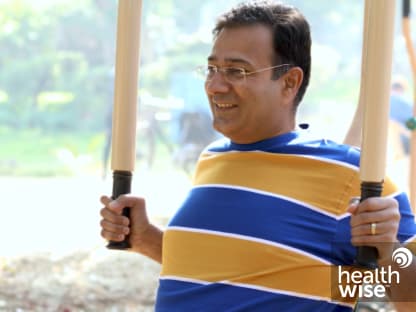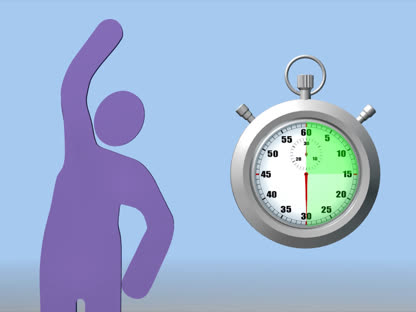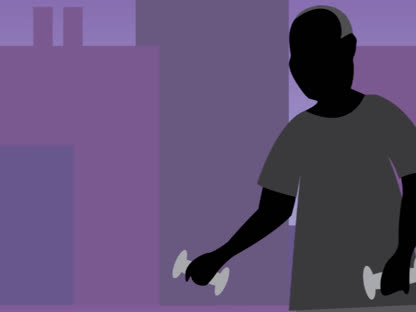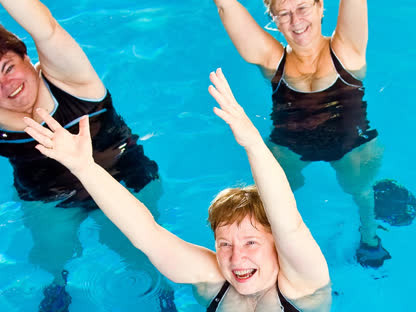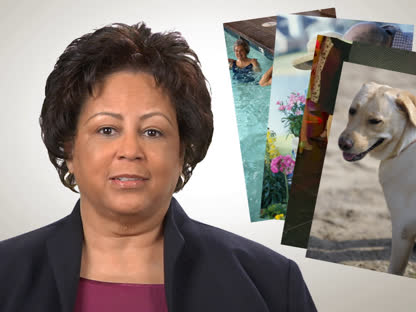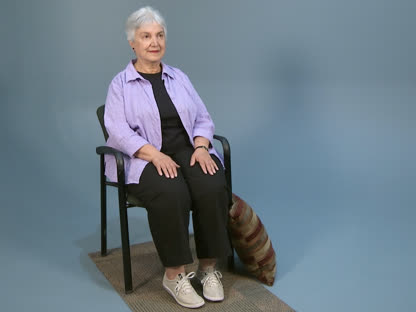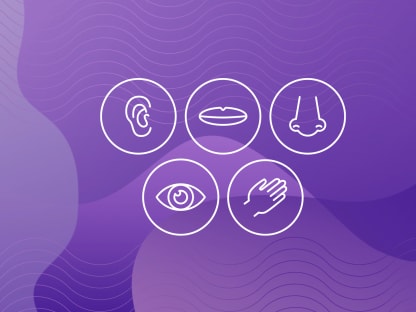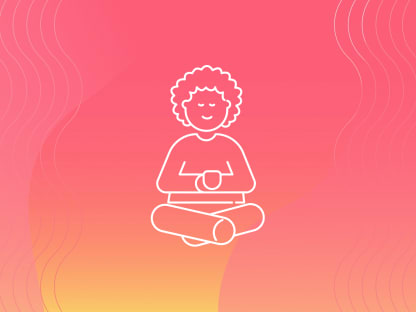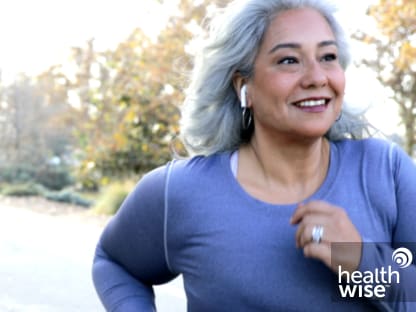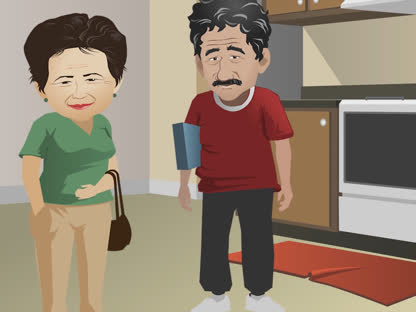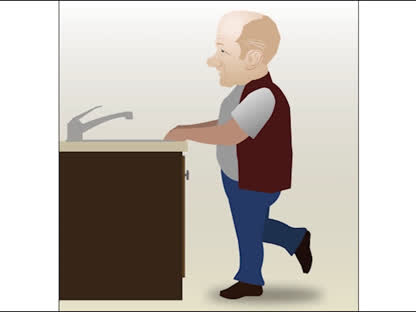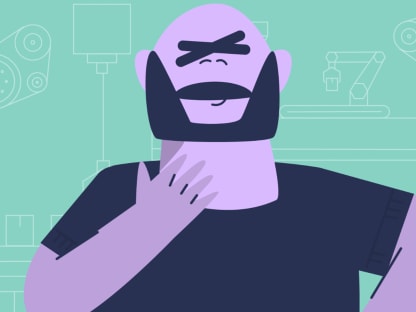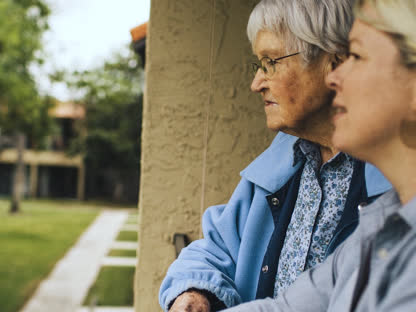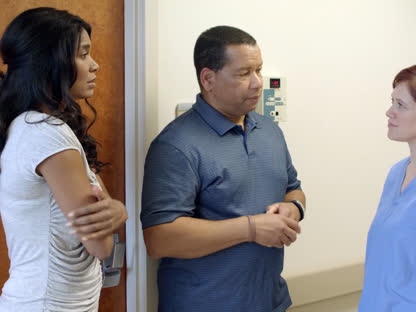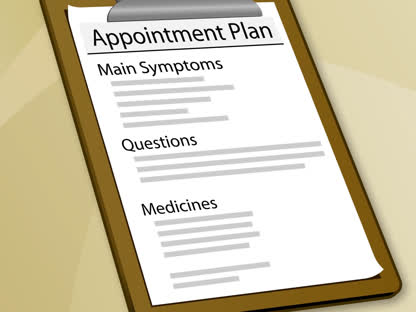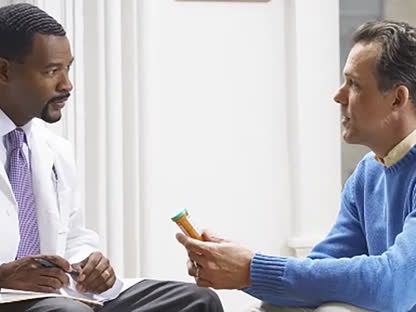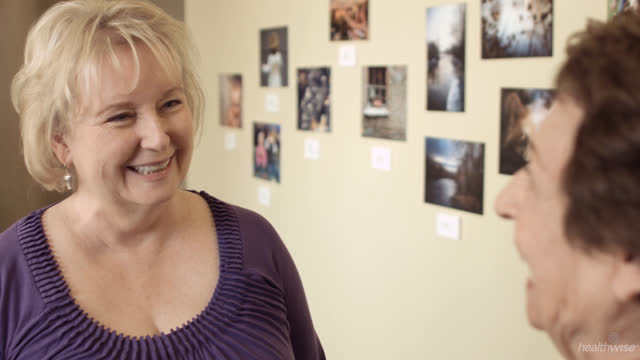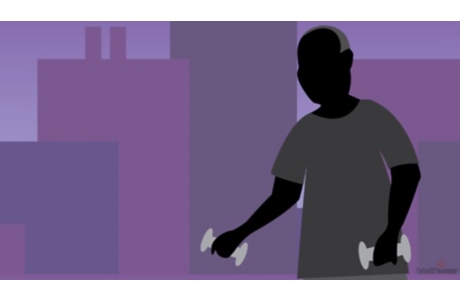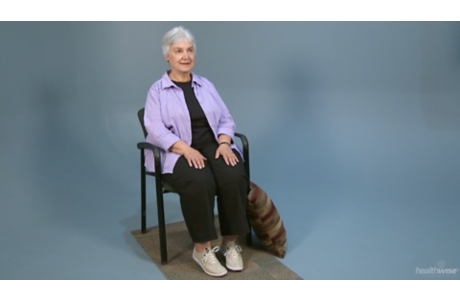Healthy Aging
Overview
What is healthy aging?
Healthy aging means different things to different people. For many people it is being healthy enough to keep doing what they enjoy.
How healthy you are as you get older depends on many things. These include your relationships and your family health history. If members of your family have health problems, like high blood pressure or diabetes, then you have a higher chance of having those problems. Your health can also depend on your access to health care, your income, and your race.
Healthy aging is also affected by your lifestyle now and when you were younger. For example, smoking can lead to health problems as you age. Your eating habits and how active you are can also affect how you age.
What kinds of changes should you expect as you get older?
Changes as you get older are usually gradual.
Certain physical changes are common. Your metabolism slows over time. This means that your body needs less food energy than before. How much and how well you sleep will likely change. Most people start to need reading glasses around age 40, and many have some hearing loss later in life. Starting in your 50s, bones get less dense and strong. You may also notice changes in sexual function. It can take longer to become aroused.
Most vital organs gradually become less efficient with age. The kidneys are less able to keep enough water in your body. The heart works a little harder during activity than it used to. So try to be active, drink plenty of fluids (unless your doctor has told you to limit fluids), and choose healthy foods. These things will help your body work well for a longer time.
What do you need to do to feel your best as you age?
Being active is one of the most important things you can do for your health at any age. Physical activity keeps your body strong, and it helps with how you feel. It can be anything from walking to gardening to working out at the gym. The important thing is to be active almost every day.
Your mental and emotional health is also important. Protect or improve your emotional health by connecting with friends, family, and the community. Try to keep stress at a minimum.
Keep your brain active and challenged to protect or improve your memory and mental sharpness. Learn or do something new and different. Attend an educational workshop, or learn a new card game.
Depression can be a serious problem for older adults. If you think you may be depressed, seek help.
Other good health habits can help you stay at your best:
- Eat healthy foods. Choose fruits, vegetables, whole grains, protein, and low-fat dairy foods. Avoid salty foods and foods with a lot of fat in them.
- If you smoke, try to quit.
Health Tools
Health Tools help you make wise health decisions or take action to improve your health.
Normal Aging
As your body ages, you can expect gradual changes. This happens at a little different pace for everyone. Many factors can affect how your body ages. These include your lifestyle, relationships, access to health care, income, and race. How you age also depends in part on your family (genetic) patterns of aging.
Some of the following changes may apply to you. Others may not. A healthy lifestyle may slow many of these normal effects of aging. Talk to your doctor about the changes you notice as you age, especially if they bother you. There are many treatments that can help.
- Skin.
With age, the skin gets less elastic and more lined and wrinkled. Fingernail growth also slows. The oil glands gradually produce less oil, making the skin drier than before. You can slow skin aging by using moisturizer and sunscreen.
- Hair.
It's normal for hair to gradually thin on the scalp, pubic area, and armpits. As hair pigment cells decline in number, you get more gray hair.
- Height.
It's common to lose height. This is often related to normal changes in posture and compression of joints, spinal bones, and spinal discs.
- Hearing.
Over time, changes in the ear make high-frequency sounds harder to hear. Changes in tone and speech are less clear.
- Vision.
Most people in their 40s start to need reading glasses as the lenses in the eyes become less flexible. (This is called presbyopia.) It's also normal for night vision and visual sharpness to decline. Also in the later years, glare increasingly interferes with clear vision. Vision changes can affect your ability to drive safely.
- Sleep.
Changes in sleep and circadian rhythm occur as you age. You will probably sleep less at night. And you may not sleep as deeply as you did when you were younger. It's more likely that you'll wake up during the night or wake up earlier in the morning.
- Bones.
Throughout adulthood, you gradually lose some of the mineral content in your bones. The bones get less dense and strong. Getting enough calcium and vitamin D and doing regular weight-bearing exercise are a few of the ways to slow bone loss and reduce the risk of osteoporosis.
- Metabolism and body composition.
Over time, the body typically needs less energy, and your metabolism slows. Hormone changes in the aging body cause a shift to more body fat and less muscle mass. The best way to manage these changes is to take in fewer calories, eat healthy foods, and be active.
- Brain and nervous system.
Starting in the third decade of life, the brain's weight, the size of its nerve network, and its blood flow decrease. But the brain adapts to these changes, growing new patterns of nerve endings. Memory changes are a normal part of the aging process. It's common to have less recall of recent memories and to be slower to remember names and details.
- Heart and blood circulation.
The heart naturally becomes less efficient as it ages. Your heart has to work a little harder during activity than it did in the past. This makes the heart muscle a little larger. You'll notice a slow decline in your energy or endurance from one decade to the next. Being active can help keep your heart strong.
- Lungs.
In people who aren't active, the lungs don't work as well over time, so they supply the body with less oxygen. Being active plays a key role in keeping your lungs strong.
- Kidneys.
With advancing age, the kidneys get smaller and don't work as well. They don't clear wastes and some medicines from the blood as quickly. And they don't help the body handle dehydration as well as in the past. Drink plenty of fluids (unless your doctor has told you to limit your fluid intake). Limit alcohol. Talk to your doctor about your medicines. Ask if there are any that you don't need.
- Urinary incontinence.
Age-related changes in the urinary system, being less mobile, and some medicine side effects can all lead to urinary incontinence. But this doesn't have to be part of normal aging. Talk to your doctor if urinary incontinence is affecting you.
- Sexual function.
It takes longer to become aroused as you age. Having difficulty with erections (erectile dysfunction) becomes more common. Vaginal dryness or pain during sex can happen after menopause. Talk to your doctor about treatments that can help.
Learn more
Physical Activity
Physical activity keeps your body strong, and it helps with how you feel. Being active gives you more energy, improves your mood, and helps keep your mind sharp. It can also help reduce your risk of getting certain diseases, such as coronary artery disease, osteoporosis, and type 2 diabetes.
What kinds of activity can help you stay healthy?
Being more active will make your daily activities easier. Physical activity includes planned exercise and things you do in daily life. There are four types of activity:
- Aerobic.
Doing aerobic activity makes your heart and lungs strong.
- Includes walking, dancing, and gardening.
- Aim for at least 2½ hours spread throughout the week.
- It improves your energy and can help you sleep better.
- Muscle-strengthening.
This type of activity can help maintain muscle and strengthen bones.
- Includes climbing stairs, using resistance bands, and lifting or carrying heavy loads.
- Aim for at least twice a week.
- It can help protect the knees and other joints.
- Stretching.
Stretching gives you better range of motion in joints and muscles.
- Includes upper arm stretches, calf stretches, and gentle yoga.
- Aim for at least twice a week, preferably after your muscles are warmed up from other activities.
- It can help you function better in daily life.
- Balancing.
This helps you stay coordinated and have good posture.
- Includes heel-to-toe walking, tai chi, and certain types of yoga.
- Aim for at least 3 days a week.
- It can reduce your risk of falling.
Even if you have a hard time meeting the recommendations, it's better to be more active than less active. All activity done in each category counts toward your weekly total. You'd be surprised how daily things like carrying groceries, keeping up with grandchildren, and taking the stairs can add up.
Getting started with being active
It's never too late to start getting active. Being fit is important for everyone. You can benefit from physical activity even if you already have conditions such as arthritis or heart disease. Being more active will help you feel better. And it may even help you live longer.
If you haven't been active for a long time, you may have no idea where to start. The important thing is to take that first step—and make that first step a small one.
- Talk with your doctor if you're worried about how exercise might affect your health.
If you're already active, ask your doctor if there is anything you should change to stay safe as your body and health change.
- Start slow.
If you have been inactive for years, start with about 5 to 10 minutes of activity at a time. Then increase your time as you get more comfortable with the activity.
- Try to improve only a little bit at a time.
Pick one area for improvement first. Set your personal goal in that area. Meet that goal before you try another area.
- Don't overdo it!
Some minor soreness or stiffness is to be expected at first. But pain is a warning sign to stop.
Learn more
- Being Active When You Have Health Problems
- Fitness: Getting and Staying Active
- Get Regular Exercise for Mental Health
- Physical Activity as You Get Older
- Physical Activity Helps Prevent a Heart Attack and Stroke
- Preventing Falls: Exercises for Strength and Balance
- Preventing Falls in Older Adults
- Quick Tips: Having Enough Energy to Stay Active
Watch
Emotional and Mental Wellness
As you get older, there are some things you can do that may protect or improve your memory and keep your mind sharp.
- Keep your brain active and challenged.
Think of activities that interest you and keep your mind sharp. Reading, doing crossword puzzles, and playing games with others are examples. You could also try learning a new language or musical instrument. Just like an active body, an active brain continues to develop and thrive.
- Use tricks to help you remember important things.
- Write down dates, names, and other important information that you easily forget.
- Use routine and repetition. For example, keep daily items such as keys and eyeglasses in a specific place. And when you meet someone new, picture that person while you repeat their name out loud several times to commit it to memory.
- Focus on one task at a time. Try not to get distracted.
- Live a healthy lifestyle.
Eat healthy foods, exercise regularly, and avoid smoking. People who do these things seem to have fewer serious memory problems such as dementia.footnote 1
- Be aware of depression.
Many people don't realize they have depression, and being depressed can cause memory problems. Talk to your doctor if you are having trouble with your memory. Ask to be checked for depression.
- Stay connected to other people.
Keep in touch with friends, family, and people in your community. Volunteer if you can. For example, you could teach others how to do something you're good at.
- Do things that feel meaningful.
Keep making time for the things that you enjoy. You could also learn something new.
- Be careful with alcohol and drugs.
These can cause memory problems or make them worse. Talk to your doctor if you need help quitting or cutting back.
- Ask your doctor about your medicines.
Some medicines can make it hard to concentrate. If you can't concentrate, it's really difficult to remember information later.
Managing stress
Here are some ways to relieve stress.
- Be active. Exercise and activity can help reduce stress. Walking is a great way to get started.
- Do something you enjoy, like a favorite hobby or listening to music.
- Meditate. This can help you relax by focusing more on the present moment.
- Do guided imagery. Imagine yourself in any setting that helps you feel calm. You can use online videos, books, or a teacher to guide you.
- Express your feelings. Talk with supportive friends or family, a counselor, or a faith leader about your feelings. Avoid discussing your feelings with people who make you feel worse. Try writing about how you feel. It may help you to see what's causing stress so you can find ways to cope.
Spiritual wellness
There is some research that links spiritual wellness with physical well-being.footnote 2 Spiritual wellness can bring comfort and lend strength for handling life's challenges. Some people find that tending to the spirit seems to be as healing as medicine itself.
Learn more
- Depression in Older Adults
- Grief: Helping Older Adults With Grief
- How You Can Help Older Adults Stay Connected
- Quitting Smoking
- Sharing Memories With Older Adults
- Simple Ways to Connect With Others and Reduce Loneliness
- Spirituality and Your Health
- Stop Negative Thoughts: Choosing a Healthier Way of Thinking
- Stress Management
Watch
Sexual Wellness
Besides physical changes, cultural and psychological factors can affect sexuality in later years. For example, in today's culture, sexuality is often tied to youthful looks and vigor. But there is no age limit for enjoying sex.
Physical and emotional needs change with time and circumstance. Intimacy and sexuality may or may not be important to you. You can live a fulfilling life with or without sex.
Normal sexual changes in males
Most physical changes are the result of decreasing testosterone levels. These changes affect energy, strength, muscle and fat mass, and bone density. They can also affect sexual function.
- Your sexual response starts to slow down after age 50. But your sex drive is more likely to be affected by your health and attitude about sex and intimacy than by your age.
- It may take longer to get an erection. Also, more time needs to pass between erections.
- Erections will be less firm. But if you have good blood flow to your penis, you should be able to have erections that are firm enough for sexual intercourse throughout your life.
- As you age, you may be able to delay ejaculation for a longer time.
Normal sexual changes in females
Most physical changes take place after menopause. They're the result of decreased estrogen levels. Taking hormone therapy can reduce these changes.
- It may take longer to become sexually excited.
- The walls of the vagina get thinner and drier. They're more easily irritated during sexual intercourse.
- Orgasms may be somewhat shorter than they used to be. The contractions felt during orgasm can be less intense.
Not everyone has these problems. If you do have problems and they bother you, talk with your doctor about treatment options.
Enjoying sex as you get older
You can have sex that feels good and is safe as you get older. Try these tips.
- Talk to your doctor if you have any health problems.
Make sure you are healthy enough to have sex.
- Go to your regular doctor visits.
And take your medicines as prescribed.
- Tell your doctor if you are too short of breath during sex.
There may be treatments that can help.
- Try using a lubricant when you have sex.
Lubricants can make sex more comfortable. They can be water-, silicone-, or oil-based. Ask your doctor about what kind may be a better option for you.
- Try different sexual positions if you have pain during sex.
Learn which positions may be good or bad for your hips, knees, or back.
- Use more foreplay and direct contact with sexual organs.
It may take extra time to become aroused as you get older.
- Talk to your doctor if you have problems with erections or vaginal dryness or pain.
There are medicines that can help.
- Protect yourself and your partner from sexually transmitted infections (STIs).
If you have more than one partner, use condoms and get tested regularly for STIs.
- Be careful with alcohol and drugs.
They can make it less likely that you will practice safe sex.
- Take care of your health.
Try to be active.
Learn more
Getting the Nutrition You Need
Good nutrition is important at any age. But it is especially important for older adults. Eating healthy foods helps keep your body strong. And it can help lower your risk for disease.
As you get older, your body needs more of certain nutrients. These include vitamin B12, calcium, and vitamin D. But it may be harder for you to get these and other important nutrients. This could be for many reasons. You may not feel as hungry as you used to. Or you could have problems with your teeth or mouth that make it hard to chew. Or you may not enjoy planning and preparing meals, especially if you live alone.
Talk with your doctor if you want help getting the most nutrition from what you eat. They may have you work with a dietitian to help you plan meals.
How do nutritional needs change as you get older?
As you get older, your nutritional needs change. For example:
- Your body's daily energy needs slowly decrease. So you may need fewer calories a day than when you were younger.
- You may need more of some vitamins and minerals, such as calcium, vitamin D, folic acid, and vitamin B6. And less iron is needed after menopause.
Help for managing underweight or poor nutrition
People who are underweight or frail have low reserves for bouncing back after an illness or injury. This can lead to ongoing health issues and the need for help with tasks and self-care.
If you have trouble keeping your weight up, there are things you can do to build your weight, energy, and resilience. Every day, follow your doctor's advice. These tips can help.
- Avoid skipping or missing meals.
If you get full quickly, try eating smaller meals more often instead of three large meals a day.
- Add high-calorie foods to your meals.
Some examples are avocados, nuts, nut butters, and cheese. Try adding extra butter, gravy, and sauces to your meals. Choose full-fat dairy products instead of low-fat or nonfat.
- Ask your doctor about your medicines.
Some medicines can make it harder for you to want to eat. Your doctor may change your medicine or have you stop taking it.
- If you can, eat some meals with other people.
This may help you eat more.
- Ask a doctor or dietitian about liquid supplements.
These drinks include Boost, Ensure, or instant breakfast drinks. Smoothies and milk shakes are other options.
If you are having trouble getting the food you need because of transportation, financial, or health problems, ask your doctor about local meal programs. Many communities have Meals on Wheels programs that can deliver food to your door. And there are often meals at places of worship and community centers that can nourish your needs for both food and social time.
Learn more
Watch
Getting the Medical Care You Need
Good health care doesn't just happen. You have to do your part. Taking an active role in your health care is the best way to make sure you get great care.
- Be an informed health care consumer.
When you are concerned about a medical condition:
- Read as much as you can about it and its possible treatments.
- Make a list of your questions, and talk to your doctor about them.
- Explore all treatment options before you decide how to treat a problem.
- Think about getting a second opinion if you're considering a surgery, a medicine with dangerous side effects, or experimental treatment.
- Be your own best health advocate.
Whenever you have a medical appointment:
- Bring your health and medicine history with you. And bring a list of questions you want answered during your appointment.
- Make sure you understand your doctor's key points about your health and any possible tests and treatments.
- You can bring along a friend or family member to support you and help you remember key information for later on. This can be especially useful when you're under a lot of physical or mental stress.
- Get organized.
Create a personal medical information file. This includes an ongoing record of your:
- Health professionals' names and numbers.
- Medicines, herbal supplements, and vitamins. For each, include the dosage, who prescribed it and why, and any side effects you've had.
- Known allergies to medicines, foods, or insects. Include the type of allergic reaction.
- Vaccine record.
- Symptoms, health problems, and treatments. For each, jot down dates and any details that you might easily forget.
- Exam and test results.
- Emergency medical information, such as pacemaker use or chronic disease diagnosis.
- Insurance policy and payment receipts.
- Write an advance directive.
Along with putting your advance directive in writing, be sure to clearly communicate your choices to all family members who might be involved in your health care.
Learn more
Watch
Related Information
- Age-Related Macular Degeneration
- Better Care at Lower Costs
- Choosing a Health Care Agent
- Choosing a Vitamin and Mineral Supplement
- Coping With Changing Sleep Patterns as You Get Older
- Coronary Artery Disease
- Cosmetic Surgery and Procedures
- Dealing With Emergencies
- Dehydration
- Dementia
- Depression
- Erection Problems (Erectile Dysfunction)
- Female Sexual Problems
- Fitness: Getting and Staying Active
- Getting Enough Calcium and Vitamin D
- Health Screening: Finding Health Problems Early
- Healthy Eating
- Healthy Eating and Older Adults
- Hearing Loss
- Heat-Related Illnesses
- Immunizations
- Insomnia
- Making the Most of Your Appointment
- Menopause and Perimenopause
- Mind-Body Wellness
- Organizing Your Medical Records
- Osteoarthritis
- Osteoporosis
- Presbyopia
- Prevent Medical Errors
- Preventing Falls in Older Adults
- Protecting Your Skin From the Sun
- Reducing Medication Costs
- Safer Sex
- Sleep Problems, Age 12 and Older
- Smart Decisions: Know Your Options
- Stop Negative Thoughts: Choosing a Healthier Way of Thinking
- Stress Management
- Understanding Lab Test Results
- Work Closely With Your Doctor
- Writing an Advance Directive
- Your Home Health Center
References
Citations
- Dhana K, et al. (2020). Healthy lifestyle and the risk of Alzheimer dementia: Findings from 2 longitudinal studies. Neurology, 95(4): e374–e383. DOI: 10.1212/WNL.0000000000009816. Accessed August 24, 2023.
- Swinton J (2012). Healthcare spirituality: A question of knowledge. In M Cobb et al., eds., Oxford Textbook of Spirituality in Healthcare, pp. 99–104. New York: Oxford University Press.
Credits
Current as of: October 25, 2024
Author: Ignite Healthwise, LLC Staff
Clinical Review Board
All Healthwise education is reviewed by a team that includes physicians, nurses, advanced practitioners, registered dieticians, and other healthcare professionals.
Current as of: October 25, 2024
Author: Ignite Healthwise, LLC Staff
Clinical Review Board
All Healthwise education is reviewed by a team that includes physicians, nurses, advanced practitioners, registered dieticians, and other healthcare professionals.
